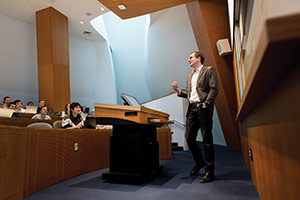launch
Finding the Sweet Spot for Competitive Behavior
 PHOTO: ANNIE O'NEILL
PHOTO: ANNIE O'NEILLRoman Sheremeta
Imagine you're in a bidding war with someone for a $100 prize. The highest bid wins, and any amount the loser risks is lost.
Got that? How much would you risk? *
Your answer—and how quickly you made up your mind—says a lot about you, explained Roman Sheremeta, PhD, an assistant professor of economics at Case Western Reserve Weatherhead School of Management. An experimental behavioral economist, Sheremeta researches how to better explain people's actions in competitive settings—whether the casino, the workplace or even the home. And what he's learned has implications for anyone who hires, fires or wants to climb the career ladder.
But back to our example. People who bid too fast also have an inclination to bid too high. They tend to be more impulsive and so competitive that they risk undermining their aims. Moreover, their quick decisions are likely to be distorted by biases and prejudices.
"Those who inhabit a sweet spot of competitiveness—who are more deliberate and moderately risky—are among the most valuable in the business world," Sheremeta said.
He understands that his views might run counter to prevailing notions about success. "You need some competitiveness level to survive—to have food on your table, to get a promotion, to get better grades," said Sheremeta. "But if you're over-competitive, you can shoot yourself in the foot."
A former chess prodigy, Sheremeta became fascinated with strategic reasoning trying to outsmart his opponents. He won more than 20 regional championships in his native Ukraine before he was a teenager, but retired from competition to focus on academics.
"Chess stirred up so much in me and steered me toward behavioral economics," he said. "Thinking many moves ahead of the opponent—that always stayed there."
In fact, Sheremeta's research reminds him to rein in his own inclination to be highly competitive—"and impulsive and wrong"— and he's changed his own behavior.
"Whenever there is something that needs to be resolved, I do not let myself react right away," he said. "That's why I don't reply to strongly worded emails until the next day."
* Your probability of winning the prize is the ratio of your bid to the sum of both your and your opponent's bids. Perhaps your first intuition is to bid $50 (as most people did in Sheremeta's studies). But a more deliberative strategy could reveal that if your opponent did the same, you'd both win nothing and lose $50 in the process. In fact, any amount more than $25 is likely too much.
Quirks of the Modern Psyche
Roman Sheremeta's research has shown that:
- People are more interested in having more than others than in how much they actually win. For example, workers may be satisfied with a small raise, so long as they believe they make more than their colleagues.
- People tend to inflate their odds, perceiving a 30 percent chance more like 40 percent, and inflating 90 percent into a sure thing. But that still doesn't quite explain why so many believe they might win the lottery.
- People risk their physical wellbeing and competition entry fees—knowing that, even if they win, they may end up banged up and a little poorer. The pleasure comes from besting the competition.





